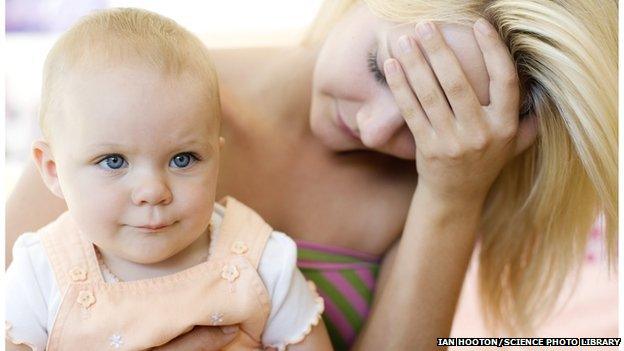Postnatal depression falling through the cracks?
- Published

Regular checks for mothers six weeks after giving birth may be too rushed to pick up cases of postnatal depression - that's the view of some leading doctors we have spoken to.
Guidelines from the National Institute for Health and Care Excellence recommend that six-week checks should look for signs of postnatal depression (PND) and that health professionals should "ensure that the woman's physical, emotional and social well-being is reviewed".
The Royal College of GPs admits this may not always happen, acknowledging that there is a long checklist to get through and it may not always be possible to do it all within the standard 10-minute appointment.
Dr Helen Stokes-Lampard, honorary treasurer of the RCGP, said: "GPs throughout the UK are under increasing pressure. We're in the midst of a funding crisis and when people are working in a system that's under pressure, clearly doctors are going to feel pressurised."
Time pressures
Dr Liz McDonald, the chairwoman of the Perinatal Faculty at the Royal College of Psychiatrists is calling for parity between mental and physical health when doctors examine new mothers. She believes around 15% of mothers are affected by postnatal depression at some stage.
She told me: "Many women are allocated 10 minutes with the general practitioner, and during that time, the general practitioner has to enquire about their physical health.
"Many women can have difficult births so there are issues around stitches and bleeding, breastfeeding - that can all take up quite a lot of time.
"So how much time is left to enquire about a woman's emotional health?"
The comments come as a survey of users of the parenting websites run by the NCT and Netmums showed that nearly half (45%) of respondents felt that the six-week check-up was not thorough enough, and 26% felt their check had been rushed.
Nearly a third (29%) said they were not asked about their mental health at all. There were more than 4,000 responses to the exercise which was run by Survey Monkey.
Belinda Phipps, chief executive of the NCT, said: "The six-week postnatal check-up is a key opportunity to spot potential problems for new mums, such as postnatal depression, as well as other physical and psychological disorders. It is worrying that almost a third of women were not even asked about how they felt. Identification early on is crucial."
NHS England points to its own Maternity Friends and Family Test covering more than than 100,000 new mothers. This suggests, according to NHS England, that most mothers are positive about the support they receive.
A spokesperson added: "We are working hard with doctors and other staff, who provide these vital services, to ensure they take the time to show the care and compassion that new mothers need at such an important time."
Postnatal depression is an area of healthcare which is not often discussed. It seems that mothers and health professionals agree that there are challenges to be addressed.
- Published11 November 2012